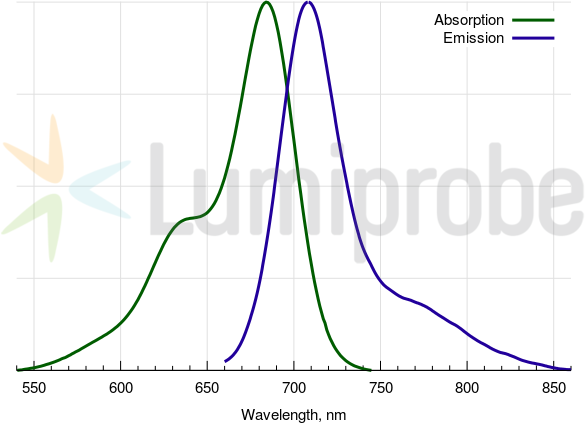Cyanine5.5 maleimide
| Cat. # | Quantity | Price | Lead time | Buy this product |
|---|---|---|---|---|
| 17080 | 1 mg |
$125
|
in stock | |
| 27080 | 5 mg |
$260
|
in stock | |
| 47080 | 25 mg |
$510
|
in stock | |
| 57080 | 50 mg |
$895
|
in stock | |
| 67080 | 100 mg |
$1490
|
in stock |

Cyanine5.5 maleimide is a thiol reactive dye which is capable of selective labeling of sulfhydryl groups in proteins, an analog of Cy5.5® maleimide.
Near infrared emission of Cyanine5.5 makes this dye suitable for bioimaging applications.
Cyanine5.5 can replace Cy5.5® and DyLight 680.
Cyanine5.5 absorbance and emission spectra

Recommended protocol
Calculator
Customers also purchased with this product
General properties
| Appearance: | dark blue powder |
| Molecular weight: | 850.89 |
| CAS number: | 1593644-50-8 |
| Molecular formula: | C46H49F6N4O3P |
| IUPAC name: | 1H-Benz[e]indolium, 2-[5-[3-[6-[[2-(2,5-dihydro-2,5-dioxo-1H-pyrrol-1-yl)ethyl]amino]-6-oxohexyl]-1,3-dihydro-1,1-dimethyl-2H-benz[e]indol-2-ylidene]-1,3-pentadien-1-yl]-1,1,3-trimethyl- |
| Solubility: | soluble in organic solvents (DMSO, DMF, dichloromethane), practically insoluble in water (< 1 uM, < 1 mg/L) |
| Quality control: | NMR 1H, HPLC-MS (95%) |
| Storage conditions: | Storage: 24 months after receival at -20°C in the dark. Transportation: at room temperature for up to 3 weeks. Avoid prolonged exposure to light. Desiccate. |
| MSDS: | Download |
| Product specifications |
Spectral properties
| Excitation/absorption maximum, nm: | 684 |
| ε, L⋅mol−1⋅cm−1: | 198000 |
| Emission maximum, nm: | 710 |
| Fluorescence quantum yield: | 0.2 |
| CF260: | 0.07 |
| CF280: | 0.03 |
Product citations
- Kumar Podder, A.; Mohamed, M.A.; Seidman, R.A.; Tseropoulos, G.; Polanco, J.J.; Lei, P.; Sim, F.J.; Andreadis, S.T. Injectable shear-thinning hydrogels promote oligodendrocyte progenitor cell survival and remyelination in the central nervous system. Science Advances, 2024, 10(28), eadk9918. doi: 10.1126/sciadv.adk9918
- Huang, S.; Gao, Y.; Ma, L.; Jia, B.; Zhao, W.; Yao, Y.; Li, W.; Lin, T.; Wang, R.; Song, J.; Zhang, W. Design of pH-responsive antimicrobial peptide melittin analog-camptothecin conjugates for tumor therapy. Asian Journal of Pharmaceutical Sciences, 2024, 19(1), 100890. doi: 10.1016/j.ajps.2024.100890
- Prabhakar, A.; Pavlov, M. Y.; Zhang, J.; Indrisiunaite, G.; Wang, J.; Lawson, M. R.; Ehrenberg, M.; Puglisi, J. D. Dynamics of Release Factor Recycling during Translation Termination in Bacteria. Nucleic Acids Research, 2023, 52(11), 5774–5790. doi: 10.1093/nar/gkad286
- De Rosa, L.; Hawala, I.; Di Stasi, R.; Stefania, R.; Capozza, M.; Nava, D.; D’Andrea, L. D. A Chemical Strategy for the Preparation of Multimodified Peptide Imaging Probes. J Org Chem, 2023, 88(7), 4546–4553. doi: 10.1021/acs.joc.3c00014
Cy® is a trademark of Cytiva.
This Product is offered and sold for research purposes only. It has not been tested for safety and efficacy in food, drug, medical device, cosmetic, commercial or any other use. Supply does not express or imply authorization to use for any other purpose, including, without limitation, in vitro diagnostic purposes, in the manufacture of food or pharmaceutical products, in medical devices or in cosmetic products.
Short link - lumiprobe.com/sh/p/M
The count of items is incorrect.


























 $
$ 
